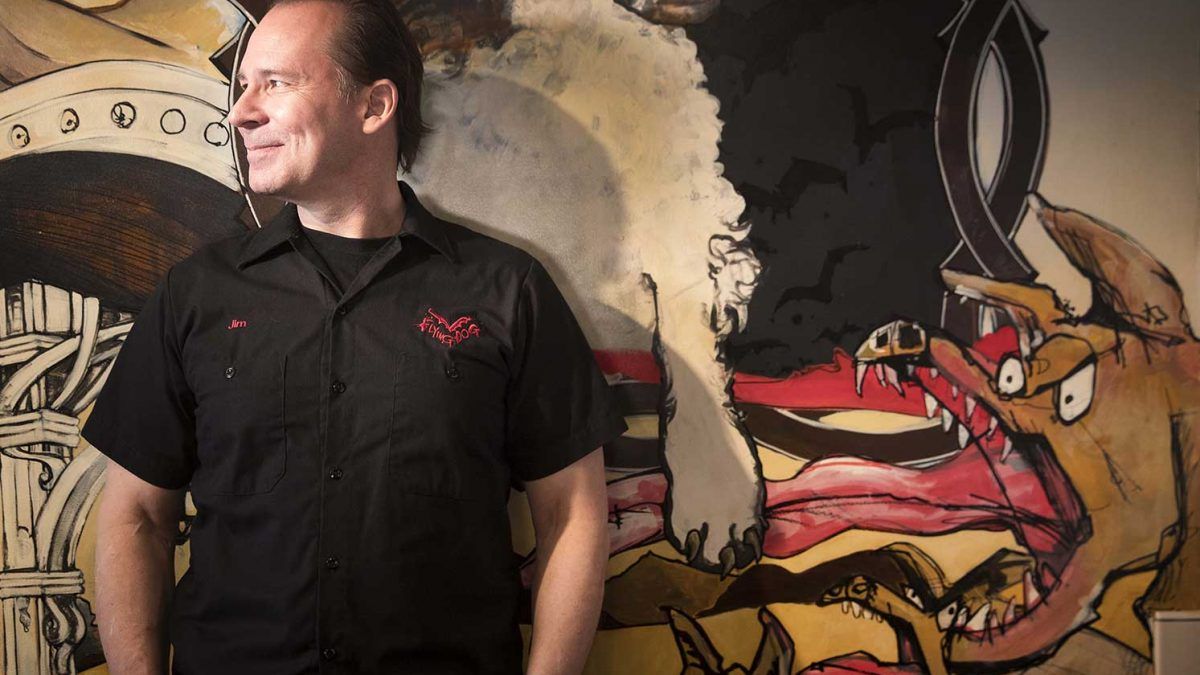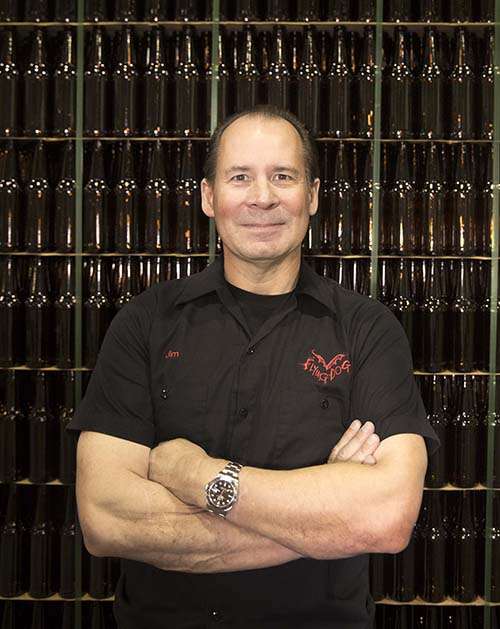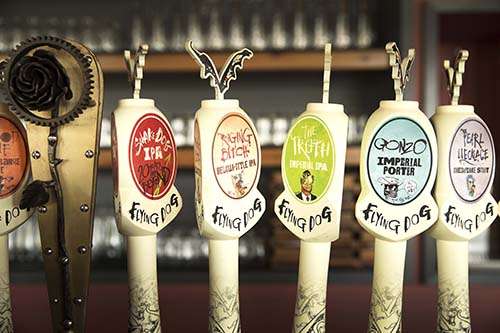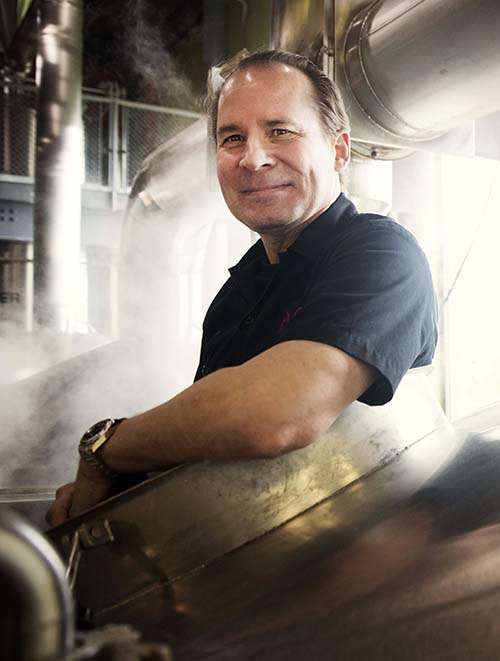Free Speech, No Shit
Brewery founder Jim Caruso doesn't give a flying dog what you think of him.

"If you ban my ability to express my message, whether it's a political message, whether it's a marketing message," says Flying Dog brewery CEO and co-founder Jim Caruso, "you're effectively taking part of my identity away. This is unacceptable."
If there's anything the beer exec loves almost as much as the suds his company produces, it's the First Amendment—and he's gone to court repeatedly to prove it. In the '90s, Flying Dog took on the Colorado Liquor Commission over its right to put the words no shit on a bottle label. In the '00s, Caruso and Co. did it all over again in Michigan, after that state branded their bestselling Raging Bitch Belgian IPA "detrimental to public health, safety and welfare."
They won both times. As Caruso, a self-described Objectivist and libertarian, points out, there should have been no doubt. The Constitution is clear: Even offensive speech is protected. Especially offensive speech, the brewer might add.
With the proceeds from those cases, Flying Dog in 2016 launched the 1st Amendment Society to fight censorship and defend free expression "beyond the courtroom."

Caruso practices what he preaches. He told The Baltimore Sun that a few years ago, when behemoth Anheuser-Busch approached him about selling the company, he responded with "a really short, two-word answer." (Hint: It wasn't "No, thanks.") The brewery is known for releasing specialty beers in an array of unusual flavors, and for selling it in bottles featuring racy slogans and distinctive artwork by gonzo illustrator Ralph Steadman. He's proud that his employees—who appear to be just as obsessed with challenging authority as their boss is—aren't afraid to drop f-bombs in his presence.
The result is a craft brewery that has become one of the most notorious and well-loved in the country. After moving operations from Denver to Frederick, Maryland, a decade ago, sales skyrocketed. Hundreds of people sometimes turn out to listen to live music and drink at the Flying Dog facility. The success has been so great that the company has already outgrown its current digs. The plan is to relocate again to a larger space on 30-plus acres in the next few years.
In April, Reason TV's Nick Gillespie visited Caruso at the brewery's tasting room. Flanked by original paintings and a taxidermied deer wearing a mustache and antlers shaped like Flying Dog's bat logo, the two discussed the history of homebrewing, the definition of obscenity, and the difference between being pro–free enterprise and pro–big business.
Reason: How did Flying Dog Brewery come to be?
Caruso: George Stranahan, true Renaissance man, Ph.D. in physics, professional photographer, professional writer. He has this real strong entrepreneurial gene. In 1990, George decided that it's time to have an affordable pub in Aspen where they had a burger less than $40 and you can get a nice fresh glass of beer.
So over on 400 Cooper Street he opened the Flying Dog Pub. In 1994, four years later, we created a brewery in Denver, Colorado, that was a joint venture between the Winco Brewing Company, which I was an owner of, and the Flying Dog.
In 1990, there were about 250 breweries total in America. We just crossed the 5,300 mark and about 600 more will open this year.
There were about 4,200 breweries back in the late 1800s, early 1900s, with a lot less population. And then the noble experiment, the Volstead Act, was enacted in 1920. The 18th Amendment made the sale, manufacture, and distribution of alcohol illegal. That went on for 13 years and basically destroyed every brewery, distillery, and winery in America.
How did breweries make it through that?
Many didn't. It wasn't easy. The number of breweries went from 4,200 to effectively zero. Except for sacramental wine and malted milk balls. You could get alcohol through prescription. These days in some states, you'll see pharmacies that are also liquor stores. In fact, my local pharmacy in Denver went from Joy Pharmacy to Joy Liquors because they found out that drugs—as profitable as they are, liquor is even more profitable.
And there's that famous story from when Winston Churchill was coming to America during Prohibition and he had a doctor's note saying that he should be given no fewer than, like, two liters of grain alcohol a day.
So once Prohibition was repealed, that was a process. It didn't exactly happen overnight. Breweries came back into existence; so did wineries and distilleries. But it was still a low point. In 1978, there were only 50 breweries in America. And then Jimmy Carter, much to his credit, signed a bill that legalized homebrewing and effectively brought artisanal craft brewing back into the mainstream.
They didn't mean to keep homebrewing illegal, did they? It's just that nobody really noticed it?
That's correct. So in 1978, it was legalized. In 1980, Ken Grossman, one of my heroes in this industry, opened Sierra Nevada. In 1984, Jim Koch opened Boston Brewery with a $100,000 investment. It's now the largest craft brewery. The next year Sam Adams was named best lager in America. Jim was very shy about promoting that.
"After the 21st Amendment, the repeal of Prohibition, states were again given the ability to monitor alcohol. And a lot of states thought that meant they were exempt from the Constitution and if they didn't like something, they would reject it."
Going back to the mid-1990s, nobody knew anything. There was nobody to turn to. So, bottles of beer exploding, we're selling out of the trunk of a car. All that sort of stuff. It wasn't taken very seriously. Whereas today, for example, we have Flying Dog University. We want people to make good beer. We've made it through 27 years. We're happy to share that knowledge.
More breweries opened in the last 90 days than existed [in the whole country] in 1990.
It's not just beer—there's been an explosion in food.
Absolutely. I tend to call this artisanal manufacturing. It's higher cost; it's lower production. It's scaling demand, not scaling supply. We're not pushing into the market; we're responding to consumer demands and offering this interesting portfolio.
"Think global, buy local" means different things to different people. One is hyper-connectivity. We are engaged in the market at many, many different levels, and it's important to know the people behind the business. The other is a quality aspect. There is a freshness to it, because you can offer a wider range of products without worrying that they're aging on the shelf more than I'd want them to.
And then there's the creativity that if you are selling 400 million barrels of beer per year, you need to sell a lot of a few styles. We sell 46 different styles here. We do a fraction of that volume, but the offerings range from mint julep beer to Mexican hot chocolate, on down the line. These experimental beers are what keep consumers engaged and interested.
It isn't just artisanal, it's artistic. Every label of a Flying Dog product has an image by Ralph Steadman, the classic illustrator who is known for his association with Hunter S. Thompson. You have a gonzo beer.
Hunter Thompson actually lived at Owl Farm, a property that George owned going back to the 1960s. He'd just written Hell's Angels. It's the 50th anniversary next year. And Ralph Steadman was doing original art for Hunter going back to 1970, for an article about the Kentucky Derby.
We loved Ralph's art, and in 1995 we asked Hunter if he would introduce us to Ralph formally and [if he would] do art for us. And we got two labels then, the Road Dog label and the Doggie Style beer label.
On the Road Dog label it says, "Good beer, no shit." What was the legal problem that came out of that?
This was our first run-in with the thought police. Our very first label from Ralph Steadman and we had an encounter. It was too perfect, right?
We thought it was art. The Colorado Liquor Commission said it's obscenity. They received a complaint from another brewer. This is an industry that's not that exciting, and we put this beer out there and this looks like a competitive advantage, so [our competitors figured] we'll file a complaint that shit is an obscenity.
Obscenity by definition is supposed to mean prurient.
Taken as a whole, does it have any literary, artistic, social, scientific value? Of course it does. So we said, "We think it's art. Ralph Steadman is an internationally famous artist." They said, "It's obscenity, pull it from the shelf."
This is 15,000 cases with a start-up business. A couple hundred thousand dollars in today's dollars. If we didn't have deep pockets, we would have been out of business. So we pulled that beer. We actually ran "Good beer, no censorship" on the label. You know, we're a small brewery. [We're] not going to fight the Colorado Liquor Commission.
Mark Silverstein from the [American Civil Liberties Union], bless his heart, took it upon himself to pick up this case. Carried it to the Colorado Supreme Court, and of course we won. Shit is not obscenity. It may be offensive to some people, but offensiveness is protected by the First Amendment. So that was our first run-in, and we went back to "Good beer, no shit."
[A number of reporters] asked Mark, "With all the injustices in the world, and people perhaps on death row incorrectly convicted, why would the ACLU spend its limited resources and time defending something as sophomoric and trivial as a beer label?" This is like the perfect question. Because when it comes down to losing constitutional freedoms, they're not lost overnight. They're chipped away at, bit by bit at the edge, until you're down to a point that's too late to defend. Where there's smoke under the door, the fire is not far behind. This of course resonated with us because this is just part of our DNA.
You've had more run-ins since then. In 2007, you had a beer called "In Heat Wheat." That was banned in Arkansas. Was that also considered obscene?
It was. After the 21st Amendment, the repeal of Prohibition, states were again given the ability to monitor alcohol. And a lot of states thought that meant they were exempt from the Constitution and if they didn't like something, they would reject it.
In 2009, Michigan banned your beer Raging Bitch. What was the complaint?
It was outrageously bad behavior by the Michigan Liquor Control Commission. They had three appointed officials who had pretty much established the policy that nothing with the name bitch on it will be allowed into the state. No wine, beer, or spirits. They'd even banned "Bitches Brew"—the famous 1970 Miles Davis album, our friends at Dogfish Head did a beer to commemorate that. However, anything with the name bastard—Fat Bastard, Arrogant Bastard, Backwards Bastard—was fine.
We sued in the Western District. They didn't rule that it was a violation of our First Amendment right to freedom of expression, but even if it were, [they ruled that] we can't sue these appointed bureaucrats.

And for us, our marketing is built into this label. If you ban my ability to express my message, whether it's a political message, whether it's a marketing message, you're effectively taking part of my identity away. This is unacceptable.
So we took our case to the [appeals court]. After several years, the opinion was in our favor. We were awarded damages. Obviously a lot went to legal fees. The rest went to form the 1st Amendment Society.
What is the mission of the 1st Amendment Society?
To ensure that we have some ongoing value from this and continue the conversation about free speech. We funded it, but it's separate from Flying Dog. We endow speakers here at the brewery, professors [who talk] about constitutional freedoms. We have a banned book club to talk about, whether it's Leaves of Grass [or] Harry Potter, the most banned book in America. Erin [Weston, the executive director] is working with the University of Maryland on a scholarship for investigative journalism. We have The Slants playing here.
Our opinion is, you can call your band whatever the hell you want and you can call your beer whatever the hell you want. And if the market doesn't like it, they're going to reject you. Raging Bitch is our No. 1 selling beer.
Are people more comfortable with free expression now?
That's a very good question. I think on average, people reject stuff that's just manufactured to be outrageous. The frat boy kind of stuff. That's not who we are. Everything we do here we find funny, and there's an audience of weird people that agree with us.
And you'll agree that some of it is sophomoric, but it's not done simply to cause outrage.
Exactly.
What I'm seeing, and I do have an opportunity to speak at colleges from time to time, is quite concerning. The younger generation embraces freedom of speech, but they want to be free from speech. In other words, there's a lot of stuff they say you shouldn't say. That you shouldn't hurt people's feelings. The very squeamish sort of mentality. They do not understand the principle behind the First Amendment and how that connects to everything.
Intellectual freedom, political freedom, economic freedom. Free markets and free minds. It's all about freedom of speech. It's concerning because that's the generation that's coming up.
When you were growing up—you're in your early 60s—there was nothing like [Raging Bitch beer] on the shelf. You couldn't watch dirty movies on TV. There was no PornHub. So how does it happen that you go from an era in which you're learning civics and you're learning basic principles of the American founding, but in a lot of ways you were less free to express yourself, to people now, who are more free but have no idea what they should be doing with it?
I think it's been a long period of peace. A lot of stuff is taken for granted. We're more removed from the immigrants that came through Ellis Island in the '20s and '30s. My grandparents came from Russia and Italy. It was surprising to me there was even such a concept as "freedom of speech." This was something that you just embraced. You just appreciated the American dream and America having the strongest constitutional protections."The week of July 21, 1977, I picked up the 20th anniversary copy of Atlas Shrugged.…I read it straight through [during an] espresso-fueled weekend from Thursday night to Sunday morning."
Do you consider yourself to be a libertarian? What clued you into that kind of thinking?
I came to libertarianism through Objectivism.
So Ayn Rand's philosophy?
Ayn Rand. The week of July 21, 1977, I picked up the 20th anniversary copy of Atlas Shrugged. By the time I was 100 pages into it, I read it straight through [during an] espresso-fueled weekend from Thursday night to Sunday morning. Point was, I want to be in that world.
I didn't know the term Objectivism. It resonated because that's just who I was. I felt validated, that it's OK to want a society this free. It will never be as free as I want, but it's OK to move in that direction. And then for the next 40 years, it informed everything about myself.
I'm a libertarian because I would like the smallest possible government. Contracts, property, restitution, self-defense—that's sort of enough for me.
You don't wake up in the morning like, "Oh, I hate the Post Office." You want to get on with making the best beer possible and having fun doing it. Is that something libertarians broadly speaking should be more focused on? If you're fixated on the government, you're wasting a lot of bandwidth?
Absolutely. You're asking the best philosophical question. Up until the Raging Bitch case, four or five years ago, I don't think anybody would have known I was a libertarian. I'm not affiliated with anything. Like most libertarians, I belong to no parties, including the Libertarian Party.
The difference is, I've lived my life as a pro-free enterprise person. Not pro-business. Pro–free enterprise, pro–consumer choice, pro–artisanal manufacturing.
This crony capitalism, special-interest politics, you ignore that. You don't get caught up by it; you don't play the game. And you go through [life] with a sense of ethics and a political philosophy that just works. I'm a happy person. And I attribute that to living as an individual.
Flying Dog moved from Colorado to Maryland because you were able to take over a bigger brewing plant that allowed you to consolidate your operations. Has the regulatory environment hindered you at all?
Cato does an in-depth study every year, Freedom in the States. Maryland is the 46th least free state. A beautiful state in many ways, but regulation is not the most endearing quality for me.
But you did move here and you're thriving.
We bought 32 acres of land near the airport. Hopefully the site of a new brewery seven times this size, a $50 or $60 million dollar project with a farm brewery and an amphitheater.
But if the environment is that Maryland enacts a law one year, and then three years later you repeal it or change it, it kills the project.

As a libertarian, I don't believe in collusion between businesses and government. Once you get into special-interest politics, you're in it forever. The contributions never stop and then you're in that game. You can no longer talk about sound economic policy and free enterprise.
I don't play that game. I've done business in 48 states. When you say, "This is how business is here." Well, my principles are formed by Objectivism and libertarianism and free enterprise and Adam Smith. That's what I bring. I don't just abandon those principles.
It is a principled stand, but also it's enlightened self-interest, because that game is a losing game.
How do we get politicians and businessmen and customers and citizens to say, "You know what, we just want a general framework of rules that apply to everybody equally and then we'll let market forces work things out"?
The libertarian message can be difficult. When you talk about freedom, the correlation to that is self-responsibility.
Freedom of speech comes with tolerance. It's going to be about different, diverse opinions. So you have to be able to manage that diversity, not ban it or threaten people or beat them up like [what happened when] Charles Murray [came to] Middlebury College.
When it comes to libertarianism, I think Ronald Reagan, in spite of the fact that he didn't make government smaller, was an excellent spokesperson. He's the kind of person you need to sell the ideas.
Are you optimistic about the next five months, the next five years?
I am. It's a choice that you go through life happy. I define myself as cheerful and optimistic. I try to bring the best energy, the best enzymes and neurotransmitters, to a situation so I can think clearly. I'm not clouded by all these negative emotions and adrenaline and cortisol. Or I try not to be.
I think everybody has a choice in any given day: How do you want to go through this period of consciousness? This is not a dress rehearsal, folks. So let's make the best of it.
I had great mentors, and I'd like to be the person that imparts some wisdom and knowledge to people. It's what gets me out of the bed in the morning. I'm on the "die on" program. I want to die on the job.
And a fair amount of Raging Bitch goes into your everyday happiness?
Those days that do get a little bit stressful, yes, Raging Bitch. It's the sexy cousin of Snake Dog. We've been brewing Snake Dog for 20 years and it's my go-to beer everyday for the last 20 years. So at the end of the day if I'm at the brewery, I have a Snake Dog and the world is right.
This interview has been edited for length, clarity, and style. For an audio version, subscribe to Reason's podcast.
This article originally appeared in print under the headline "Free Speech, No Shit."


Show Comments (2)